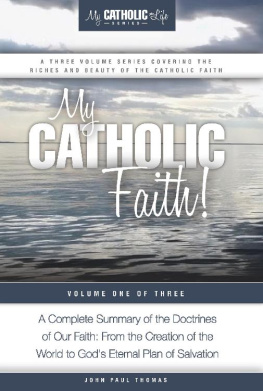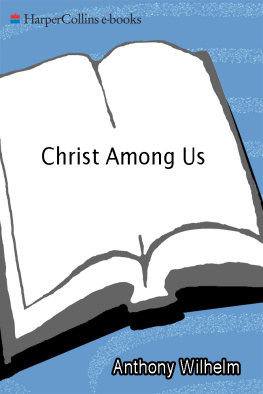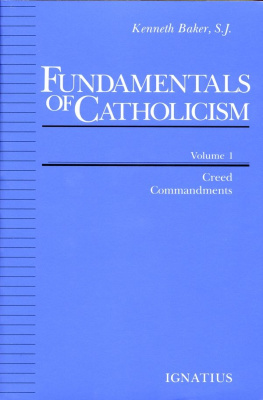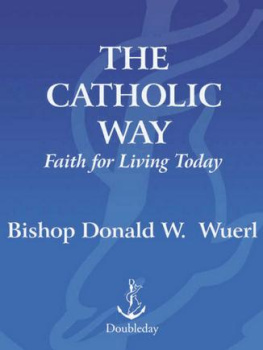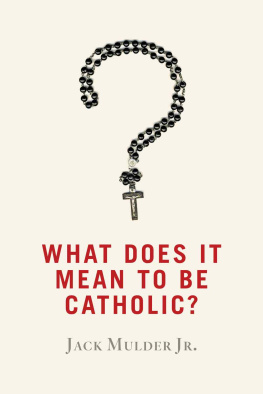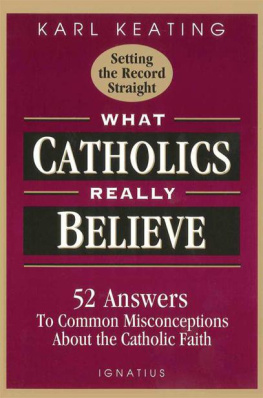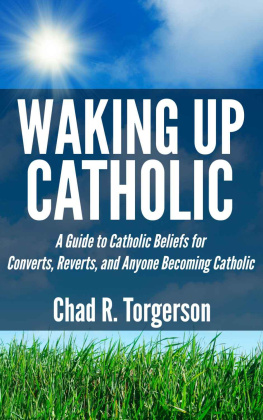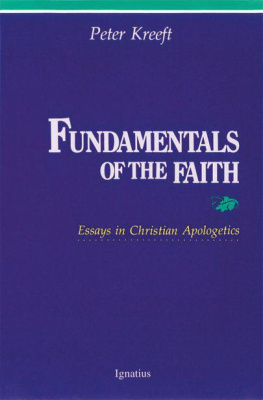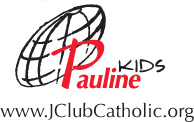the
FAITH
we
PROFESS
A Catholic Guide
to the Apostles Creed
PETER J.
VAGHI
foreword by
Archbishop Donald W. Wuerl

Scripture texts used in this work are taken from The New American Bible copyright 1991, 1986, and 1970 by the Confraternity of Christian Doctrine, Washington, D.C., and are used by permission of the copyright owner. All rights reserved. Translation of the Magnificat by the International Consultation on English Texts.
Excerpts from The Catechism of the Catholic Church, second edition, copyright 2000, Libreria Editrice Vaticana-United States Conference of Catholic Bishops, Washington, D.C. Used with permission. All rights reserved.
2008 by Peter J. Vaghi
All rights reserved. No part of this book may be used or reproduced in any manner whatsoever, except in the case of reprints in the context of reviews, without written permission from Ave Maria Press, Inc., P.O. Box 428, Notre Dame, IN 46556.
Founded in 1865, Ave Maria Press is a ministry of the Indiana Province of Holy Cross.
www.avemariapress.com
ISBN-10 1-59471-177-1 ISBN-13 978-1-59471-177-0
Cover and text design by David R. Scholtes.
Printed and bound in the United States of America.
Library of Congress Cataloging-in-Publication Data
Vaghi, Peter J.
The faith we profess : a Catholic guide to the Apostles Creed / Peter J. Vaghi.
p. cm.
Includes bibliographical references.
ISBN-13: 978-1-59471-177-0 (pbk.)
ISBN-10: 1-59471-177-1 (pbk.)
1. Apostles Creed 2. Catholic Church--Doctrines. I. Title.
BT993.3.V34 2008
238'.11--dc22
2008013081

D edicated in memory of both my mother, Agnes, whose dedication as a writer continues to inspire me, and my father, Joseph, who graduated as an officer in May 1943 from the Naval Officer Training School at the University of Notre Dame, for valiant service at Normandy and Okinawa.
In addition, I extend my gratitude to the parishioners of Little Flower Parish in Bethesda, Maryland, where I am presently pastor, and to the members of the John Carroll Society for whom I have served as chaplain.
Special gratitude to my family, to my editor Robert M. Hamma, to Gerald O'Collins, S.J., Monsignor Kevin Hart, Adoreen McCormick, and Kevin J. McIntyre, who provided valuable assistance with the text.
CONTENTS
FOREWORD
A s the pastor of a large and thriving parish, Monsignor Peter J. Vaghi has many opportunities to teach, lead and sanctify the faithful entrusted to his care. The Faith We Profess: A Catholic Guide to the Apostles Creed is a testimony to Monsignor Vaghi's profound commitment to be a teacher of the faith for his people. Pastors teach in various ways, but Monsignor Vaghi has set an example of providing careful instruction in an engaging style that brings the reader through the articles of the creed in a manner that is inviting in its presentation and informative in its content.
What is evident in this book, which is a collection of reflections Monsignor Vaghi has offered his parishioners, are his many years of experience in explaining the faith to those whom he shepherds. One has the sense in reading this book that Monsignor Vaghi is responding to questions and inquiries, observations and the experiences of his parishioners.
What characterizes this work is its ability to present the doctrine found in the Catechism of the Catholic Church as well as in the United States Catholic Catechism for Adults in clear and popular language. It thus becomes a timely contribution to our Church's mission of a new evangelization. In concise, easy-to-understand language, Monsignor Vaghi explains how the content of the catechisms on the universal and national level touch our lives. He uses the words of Sacred Scripture, examples from everyday life and his own extensive pastoral experience to delve more deeply into each of the articles of the Creed in a way that makes them come alive.
One can think of any number of ways in which this book will be helpful, but two come immediately to mind. Adult faith formation is increasingly a significant part of the ministry of the Church especially at the parish level. This book is a rich resource for parish adult faith formation programs and, in a special way, for the Rite of Christian Initiation for Adults. In this area where there is a recognized need to provide a systematic presentation of the faith, Monsignor Vaghi's book presents an ideal companion for those making the faith journey that will bring them to the Easter sacraments of initiation.
Another area where The Faith We Profess can be of immeasurable assistance is with the ever increasing number of Catholics interested in knowing more about their faith so that they can be a voice of the faith in our world today, prepared to bear witness among their peers, friends, and associates to the truth and meaning of the Church's teaching. Increasingly, in response to the pressures of an ever more secular culture, many Catholic women and men are looking for clear, well written, concise, and engaging material that can better form them to be witnesses to the faith in their many and varied circumstances. This book is an answer to that need. Monsignor Vaghi has done all of us engaged in the effort of proclaiming the faith a great service as we work to illuminate the richness of our Catholic faith and guide others to a deeper understanding and appreciation of the Church's message.
Most Reverend Donald W. Wuerl
Archbishop of Washington D.C.
An Introduction to
the Apostles Creed
I n a beautiful homily preached on September 12, 2006, in Regensburg, Germany, Pope Benedict XVI spoke of the Apostles Creed as a summa or summary of everything we believe. He described how the Apostles Creed is divided into twelve articles corresponding to the twelve apostles. He likewise observed that the Apostles Creed is divided into three main sections referring to the Trinity and the baptismal formula: I baptize you in the name of the Father, and of the Son, and of the Holy Spirit. The Apostles Creed that we know today comes from an ancient creed used in Rome by candidates for Baptism when they professed their faith.
Hence, the Pope points out:
The Creed is not a collection of propositions; it is not a theory. It is anchored in the event of Baptisma genuine encounter between God and man. In the mystery of Baptism, God stoops to meet us; he comes close to us and in turn brings us closer to one another. Baptism means that Jesus Christ adopts us as his brothers and sisters, welcoming us as sons and daughters into God's family.
For Benedict, the creed is thus primarily an encounter with Christ and not just a way of expressing the contents of our faith.
We have inherited two creeds from the early Church: the shorter Apostles Creed that is derived from preparation for Baptism and took shape in the third century; and the longer Nicene-Constantinopolitan Creed (often called simply the Nicene Creed) that is derived from two General Councils of the Church held in Asia Minor: Nicea I (325) and Constantinople I (381).
The Apostles Creed was geared to the needs of those preparing for Baptism. The Nicene Creed confronted errors about Christ and the Holy Spirit and expressed the faith of all Christians: that Christ is truly divine and truly human, and that the Spirit is the divine guide of the Church. Used at the Eucharist in all the churches of Eastern and Western Christianity, the Nicene Creed expresses the way from east to west a perfect offering is made to the glory of God's name (Eu-charistic Prayer III).
Next page

